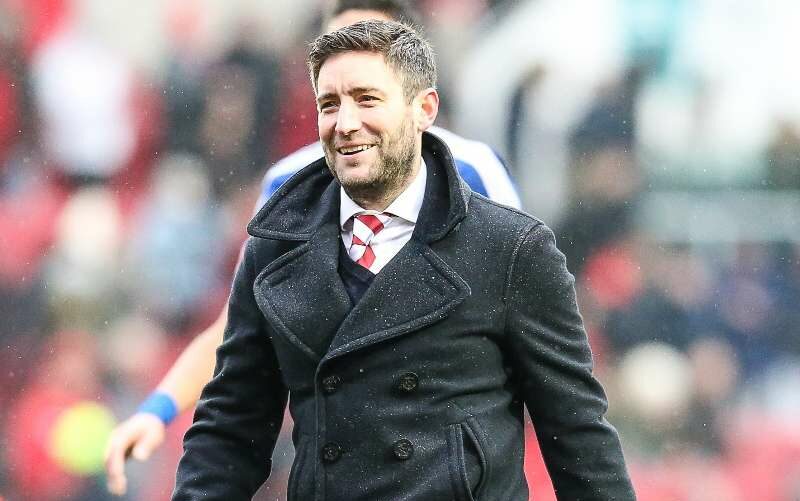All smiles: Lee Johnson got off to a great start at Ashton Gate with a 2-1 victory over Ipswich Town (photo by Shane Healey/Pro Sport)
FORGET the baby face. Forget the tender years. At 34, Lee Johnson has already endured more controversy than most managers face in a career.
Johnson was just six months into his first job at Oldham when the club’s Colombian winger Cristian Montano was arrested on suspicion of spot-fixing. Sacked and subsequently cleared, the fallout was bitter.
Then, in January 2015, Johnson was the man caught in the crossfire when Oldham attempted to sign convicted rapist Ched Evans.
Suddenly, a guy used to planning coaching sessions was expected to expound tactfully on the criminal justice system and the game’s moral obligations – all in the glare of the national media.
He may have quit the game just three years ago but, when it comes to management, the new Bristol City gaffer is a million miles from a rookie.
“Yes, I’ve seen some toxic times,” says Johnson, whose father, current Cheltenham boss Gary, managed the Robins for five years before leaving in 2010.
“My dad has been a manager for 20 years but he’s never had a Ched Evans.
“He’s never had a trip to Anfield in the FA Cup. He’s never had a spot-fixing case. It just goes to show what a bizarre job this is.
“How difficult were those issues? Very difficult. To be honest, I don’t really want to speak about Ched. It’s been and gone.
“But whenever you’re dealing with sensitive issues like that, especially in the public eye, you have to be respectful to all parties. Consider every possible opinion.
“It’s actually very hard to say something that is neutral and doesn’t offend.
“You have to be very clever with your wording and make sure you don’t give the Press anything that will make a headline.
“You have your own opinions, of course. But you’re representing the club.
“And when you’re going toe-to-toe with the Prime Minister because he’s making comments as well, you’re thinking ‘Er, no Pro Licence course told me how to deal with this one!’
“Chuck in a couple of relegation battles as well and yeah, it’s been a pretty steep learning curve for me.”

Yet for all the off-field shenanigans, perhaps the toughest test for Johnson came this winter, as his Barnsley side plummeted headlong through League One.
Up to that point, Johnson had ridden the wave. Oldham – the club he joined in March 2013 at the age of just 31 – were saved from relegation, then transformed into a top-half side.
That tempted the Tykes to lure Johnson away and, by the end of September, a 2-0 win over Gillingham put them just outside the League One play-offs.
But the milk soon soured, the honey spoiled. Ravaged by injury, a hideous run of nine straight defeats saw Johnson odds-on to be sacked.
Yet the fact that Johnson sits here today as the manager of a Championship side should tell you he clung on.
The slump was arrested. The victories returned. In the end, the Tykes were so determined to keep their man that City paid compensation.
“Patrick Cryne, the owner at Barnsley, was fantastic,” says Johnson. “Of course it was a bit hairy at times.
“I’m not going to sit here and pretend we didn’t have big discussions about the future.
“But we both understood that a lot of the problems were circumstantial. We lost key contracted players to injury and already had seven loanees so we couldn’t replace them.
“If you were asked to pick out a worst-case scenario at the start of the season, that would have been it.
“What was really poor was when we lost to Altrincham in the Cup. We got beat fair and square. We didn’t perform.
“If there was any time I was going to go, it was probably then.
“But Patrick and the board actually went the other way.
“They allowed me to get in three or four players and that completely turned the season. It’s a good message to football. If someone is working hard and you believe in them, stick with it.
“Ask yourself ‘Are the players still performing for the manager? Are we still sticking to our principles. Are we sticking to the plan? Are we in regular communication? If the answer is yes, then there’s not much wrong.
“And that’s not just sentiment talking either. Through staying strong, they’ve made a tidy profit instead of having to pay off a manager.
“In a business sense, it works.”
Having spent just 11 months at Oakwell, Johnson is the flip side of the argument that managers have a short shelf life.
Twice now, he has moved when his stock is high. Is that ruthlessness calculated?
“I can understand why people might say that, and it’s something I’m very conscious of,” admits Johnson, who spent six years at Bristol City as a crafty midfielder, winning promotion from League One in 2007 and reaching the Championship play-off final a year later.
“I don’t want to be seen as a club-hopper. That’s a bad reputation for anybody and I mean it when I say I want to be here a long time.
“A famous manager once said to me ‘You’ve got to prepare like you’ll be at a club forever but understand that you could be gone tomorrow’.
“Every decision I’ve ever made, that’s been my philosophy. I try to do my business in the right way, to be loyal to my club.
“The two moves I’ve made, there was no skulduggery, every party has been happy. That’s important to me.
“Leaving Barnsley was a big wrench. I’d grown very attached to people there. But this club feels like my home.
“I spent five years at Yeovil, six-and-a-half with City.
“I met my wife in the south-west. Her family lives here. My dad lives in Portishead.
“It’s a place that’s dear to me and a club that’s close to my heart. It was always an ambition to manage here.”
And for Johnson – who has studied the academies of Ajax and Barcelona – the greatest ambition of all is to nurture a team full of homegrown kids playing his own brand of passing football.
“You have all these dreams and aspirations of how you want to play,” he says. “And what I found in the lower leagues is that you can get maybe 11 or 14 players to play that way.
“At Oldham, I found that we had a very good XI. It was the same at Barnsley. Unfortunately, I haven’t been at a club long enough to implement my dream, which is to get 11 homegrown players out playing the way you want.
“I’d love to be at City long enough to achieve that.”
Whether he does it or not remains to be seen. In football, as he’s already discovered, you never know what’s around the corner…
















